There are four main tenets of off-grid living:
- Generating electricity
- Collecting rainwater
- Treating/Dealing with Waste
- Reducing energy/water use and minimising waste
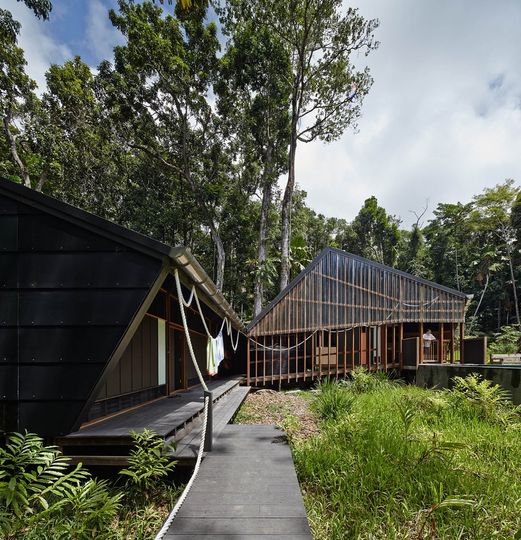
This Cape Tribulation Home has no more trials (sorry) thanks to going off-grid. Located in a remote and sensitive environment, going off-grid was the only viable option, but it certainly adds to the charm and experience of this unique home.
Going off Grid
The 'grid' is the centralised services that we rely on in cities and towns. It includes electricity, water and waste disposal. In some areas it even includes heating (NYC, for example, has a reticulated steam system). Many people choose to go off-grid for environmental and sustainability reasons - allowing them to minimise their impact on the planet, or environmental footprint. Many others are somewhat forced into it because they live in a remote area where the cost of connecting to services becomes prohibitive. Depending on the area you're in, if you're planning to go off-grid you may need approval from the local authorities. It seems crazy you need permission to not use services, but it's very important you get all the right permissions before 'unplugging'. So check with your local authorities about any approvals you might need to collect your own rainwater or seal off your sewerage pipe.
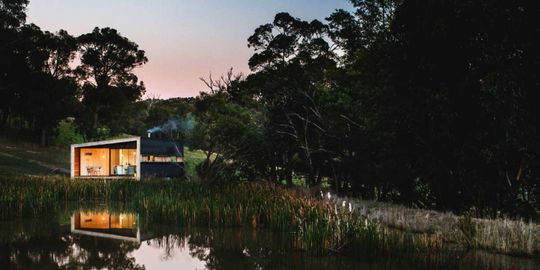
The compact Pump House keeps things simple and lo-tech to minimise its energy requirements. You won't find any big screens in this minimal retreat, but you might get a visit from the local horse. Not even kidding.
Generating Electricity
To be fully off the grid, you'll need to generate your own electricity (solar, wind, hydro, biofuel, diesel, etc.).
Once you're generating your own electricity you'll likely need a way to store that electricity until you're ready to use it - so a battery system. New breeds of at home batteries like the Tesla Powerwall and Australian competitor AllGrid will make going off-grid even more accessible and affordable.
The alternative, ironically, is to set up a grid-connected solar system. This allows you to feed energy back into the grid when you're generating a lot but not using much (like in the middle of the day when the sun's shining but you're stuck in your office). Don't worry, as long as you're producing more net energy than you're consuming I'll still consider you off-grid.
If you're going to all this effort and expense to generate your own electricity, it makes sense to minimise the amount of energy you require. So energy efficient design, appliances and systems would be a wise investment.
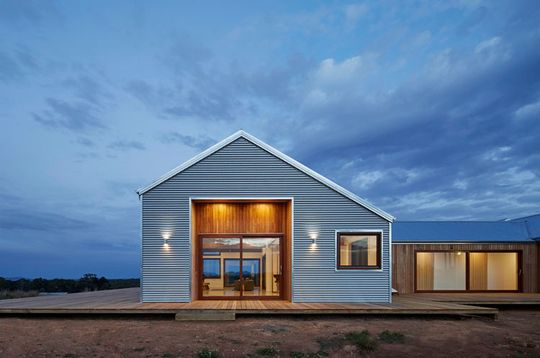
The modern farmhouse, 700 Haus, supplies its own water plus water for firefighting, treats waste water on site and runs on minimal energy. Ultimately it will become completely off-grid with an extensive PV solar array.
Collecting Rainwater
You'll also need to collect rainwater for use in the home or have some other fresh water source. Something that many people aren't aware of is rainwater should be filtered and treated with UV to kill the bacteria to make is safe for drinking (birds have a tendency of pooping on the roof which can contaminate tank water). There are also a whole host of systems you can install to ensure the cleanest possible rainwater - like gutter guards, first flush diverters, and mosquito guards.
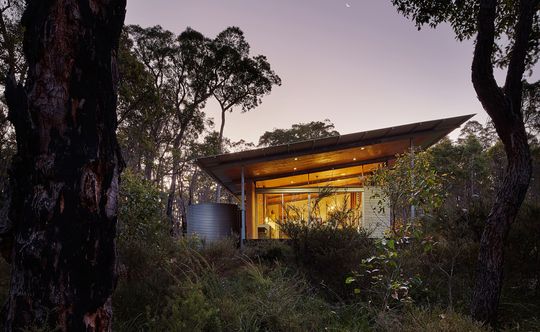
Bush House collects rainwater, produces energy from a 3kW ground mounted solar array, heats water with a roof mounted solar hot water heater and treats blackwater with a worm-farm treatment system that irrigates the garden with nutrient rich water.
Treating/Dealing with Waste
Finally you need to be able to deal with waste - especially sewage. One clever way a lot of off-grid homes operate is to seperate grey water from black water. Greywater is waste water from the shower, washing machine and (sometimes) the kitchen, while blackwater is from the toilet. Greywater is easier to treat and can be reused for flushing the toilet and watering the garden. Blackwater is more difficult to treat (but it's still possible) because it contains a lot of bacteria that can affect our health. By separating black and grey water you can reduce overall water use which is important if you're relying on rainwater. The other waste you should be thinking about is food waste and general rubbish, so composting and recycling become important for off-grid living.
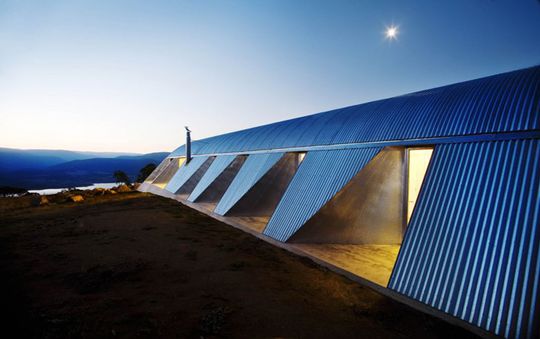
This home in the Snowy Mountains has curves many women would kill for. Inside, it defies its cold, windy location by feeling warm and bright. Good solar orientation, combined with a wood fireplace connected to a hydronic floor heating system keeps the home warm even when the mountains are living up to their name outside.
Reducing Energy/Water Use and Minimising Waste
Saving electricity on heating and cooling is one area you should really focus on if going off-grid. A passive solar design will help your home to stay warmer in winter and cooler in summer even without active heating and cooling. It uses the sun's energy to warm up the home in winter and natural ventilation to keep it cooler in summer. If you do require auxiliary heating/cooling, there are more efficient and sustainable options you should consider. In many areas, thermal mass is also important to moderate the temperature. Thermal mass is high in things like concrete, bricks and even water. Insulation is important to keep the warmth in in winter and the heat out in summer.